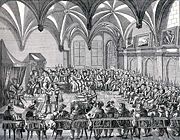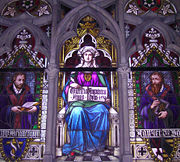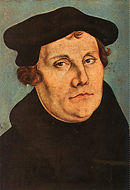Augsburg Confession
| Part of the series on Lutheranism |
|
 |
|
| Luther's Seal | |
| History | |
|---|---|
|
Christianity |
|
| People | |
|
Martin Luther · Johann Sebastian Bach |
|
| Book of Concord | |
|
Augsburg Confession |
|
| Theology and Sacraments | |
|
Evangelical Catholic · Law and Gospel |
|
| Liturgy and Worship | |
|
Agenda · Divine Service |
|
| Denominations | |
|
Confessional Ev. Lutheran Conference |
|
The Augsburg Confession, also known as the "Augustana" from its Latin name, Confessio Augustana, is the primary confession of faith of the Lutheran Church. The Augsburg Confession is, by its catholic nature (meaning "universal" in its application to Lutheran churches), normative to all Lutheran Churches everywhere and in all times. It is also one of the most important documents of the Lutheran reformation. The Augsburg Confession was written in both German and Latin, and was presented by a number of German rulers and free-cities at the Diet of Augsburg on June 25, 1530. The Holy Roman Emperor Charles V had called on the Princes and Free Territories in Germany to explain their religious convictions in an attempt to restore religious and political unity in the Holy Roman Empire, and rally support against the Turkish invasion. It is the fourth document contained in the Lutheran Book of Concord.
Felix Mendelssohn's 5th Symphony (actually his 2nd Symphony in order of composition) was composed to celebrate the 300th anniversary of the Augsburg Confession and thus bears the title The Reformation Symphony. The Symphony, however, was not commissioned for the celebrations, because of either the composer's Jewish origins, or because of the inappropriateness of a symphony for the celebrations. Instead, Eduard Grell's work for four men's voices a capella was commissioned.
Contents |
Origin of the Confession

On January 21, 1530, the Emperor Charles V issued letters from Bologna, inviting the German diet to meet in Augsburg April 8, for the purpose of discussing and deciding various important questions. Although the writ of invitation was couched in very peaceful language, it was received with suspicion by some of the Evangelicals. The far-seeing Landgrave of Hesse hesitated to attend the diet, but the Elector John of Saxony, who received the writ March 11, on March 14 directed Luther, Jonas, Bugenhagen, and Melanchthon to meet in Torgau, where he was, and present a summary of the Lutheran faith, to be laid before the emperor at the diet.
This summary has received the name of the "Torgau Articles". On April 3 the elector and reformers started from Torgau and reached Coburg on April 23. There Luther was left behind. The rest reached Augsburg May 2. On the journey Melanchthon worked on an "apology", using the Torgau articles, and sent his draft to Luther at Coburg on May 11, who approved it. Several alterations were suggested to Melanchthon in his conferences with Jonas, the Saxon chancellor Bruck, the conciliatory Christopher von Stadion, bishop of Augsburg, and the imperial secretary Alfonso Valdez.
On June 23 the final form of the text was adopted in the presence of the Elector John of Saxony, the Landgrave Philip of Hesse, the Margrave George of Brandenburg, the Dukes Ernest and Francis of Luneburg, the representatives of Nuremberg and Reutlingen, and other counselors, besides twelve theologians. After the reading the confession was signed by the Elector John of Saxony, Margrave George of Brandenburg, Duke Ernest of Luneburg, the Landgrave Philip of Hesse, the Prince Wolfgang of Anhalt, the representatives of Nuremberg and Reutlingen, and probably also by the electoral prince John Frederick and Duke Francis of Luneburg.
During the diet the cities of Weißenburg in Bayern, Heilbronn, Kempten, and Windesheim also expressed their concurrence with the confession. The emperor had ordered the confession to be presented to him at the next session, June 24; but when the evangelical princes asked that it be read in public, their petition was refused, and efforts were made to prevent the public reading of the document altogether. The evangelical princes, however, declared that they would not part with the confession until its reading should be allowed. The 25th was then fixed for the day of its presentation. In order to exclude the people, the little chapel of the episcopal palace was appointed in place of the spacious city hall, where the meetings of the diet were held. The two Saxon chancellors Bruck and Beyer, the one with the Latin copy, the other with the German, stepped into the middle of the assembly, and against the wish of the emperor the German text was read. The reading lasted two hours and was so distinct that every word could be heard outside. The reading being over, the copies were handed to the emperor. The German he gave to the imperial chancellor, the Elector of Mainz, the Latin he took away. Neither of the copies is now extant.

The first official publication (Editio princeps) was edited by Philipp Melanchthon, a professor at the University of Wittenberg and close friend of Martin Luther.
In 1540, Melanchthon produced a revised edition, the Variata, which was signed by John Calvin. Many Lutheran churches specify in their official documents that they subscribe to the "Unaltered Augsburg Confession", as opposed to the Variata.
The Unaltered Augsburg Confession is the primary confessional document of the Lutheran faith and is part of The Book of Concord.
Contents
Preface
A plea for Christian unity, and a promise that the Lutherans "are neglecting nothing that may serve the cause of Christian unity."
Articles of Faith
I. Concerning God — a brief explanation of the Trinity, which was not a point of controversy. However, various opponents claimed that Luther did not accept such a doctrine, so its inclusion is understandable.
II. Concerning Original Sin — a brief explanation of Original Sin, which was not a point of controversy either.
III. Concerning the Son of God — a standard, short explanation of the dual nature of Jesus. Not a point of controversy.
IV. Concerning Justification — the doctrine of Justification by Faith. This was the primary difference between Lutherans and Roman Catholics at the time. This article appeals to Paul's epistle to the Romans.
V. Concerning the Office of Preaching — a brief statement on the preaching. Not a point of controversy, though the Anabaptists are condemned for teaching that the Holy Spirit does not come to humans without their "preparations and works."
VI. Concerning New Obedience — a statement saying that works are good, but have no merit before God. This is opposed to the Roman Catholic doctrine of justification.
VII. Concerning the Church — a statement on the belief in one Christian Church. Not a point of controversy.
VIII. What is the Church? — a statement on the acceptance of all believers into the aforementioned church. The Donatists are condemned for obvious reasons.
IX. Concerning Baptism — a statement on the belief in infant baptism and a condemnation of the Anabaptists for preaching otherwise. Not a point of controversy for the Diet.
X. Concerning the Lord's Supper — a statement on the Lutheran view of the Real Presence in the Eucharist. All other views are condemned.
XI. Concerning Confession — a statement supporting the practice of confession, although it is stated that no one was able to confess all their sins.
XII. Concerning Repentance — a statement on the belief that repentance is to feel sorrow for one's sins; it includes both contrition and faith and that the Church ought to impart absolution to those thus returning to repentance. Anabaptists who teach that to be baptized is to be free of sin are condemned, as well as Novatians.
XIII. Concerning the Use of Sacraments — a standard statement on the use of sacraments, which was not a point of controversy. Those who say that one is justified by use of sacraments without faith are condemned.
XIV. Concerning Church Government — a standard statement on the belief that one must be called to be a minister. Not a point of controversy.
XV. Concerning Church Regulations — a statement about how festivals not commanded in the Bible will have no bearing on justification and are contrary to the gospel.
XVI. Concerning Public Order and Secular Government — a statement in support of secular government. Anabaptists are condemned for teaching otherwise, along with a condemnation of those who do good for fear of the government and not God. Not a point of controversy.
XVII. Concerning the Return of Christ to Judgment — a standard statement about the End Times, which states that Jesus will judge the living and the dead, the elect will go to heaven and the "ungodly" will go to Hell. Condemned are Universalism and the belief that the elect will have a secular government. Not a point of controversy.
XVIII. Concerning Free Will — a statement about the belief in man's inclination to sin, and the need for external help from the Holy Spirit to please God. Those who teach that man can keep the commandments without the Holy Spirit are condemned. This is only a controversy insofar as the scholastics who taught that man does have some say in whether or not he/she may please God.
XIX. Concerning the Cause of Sin — a statement on the inclination of evil and "ungodly" people to sin. This was not a point of controversy.
XX. Concerning Faith and Good Works — a statement about good works being good, but not assisting in salvation and standing before God. This is followed by an explanation and defense of the doctrine of Justification by Faith.
XXI. Concerning the Cult of the Saints — a statement about the nature of saints: helpful to assisting in one's personal faith, but of no post-mortem metaphysical use.
Disputed articles, listing abuses that have been corrected
This deals with some of the wrongs that had been "righted" by the Evangelicals and explains their reasons for such changes. At other points, arguments are made about necessary changes.
XXII. Concerning Both Kinds of the Sacrament — a statement explaining scriptural and historical grounds for distributing both elements of the Eucharist to laity, who had been permitted to receive the bread only.
XXIII. Concerning the Marriage of Priests — a lengthy argument that there is Scriptural basis for allowing priests to marry.
XXIV. Concerning the Mass — another lengthy argument, this time as to the nature of Mass, asserting that "Falsely are our churches accused of abolishing the Mass; for the Mass is retained among us, and celebrated with the highest reverence". It is argued that all sins were forgiven by the "satisfaction" (from the Latin satis facere, 'make complete') of Jesus' death. Roman Catholics hold that the death of Jesus forgives all sins, but distinguish between forgiving the guilt of sin, and the 'satisfaction' (making complete) required for the 'pain' of sin, i.e., penance.
XXV. Concerning Confession — reiteration of the view that private absolution is no better than general absolution. While the Evangelical Church still practiced private absolution, it was maintained that it was Christ, not the pastor, who forgave the sins. The Roman Catholic and Eastern Orthodox view is the same concerning who forgives sin, however both Roman Catholic and Eastern Orthodox view general absolution as a rite to be used only when private absolution is impractical.
XXVI. Concerning the Distinction among Foods — a statement that scheduled fasting, ceremonies, etc., were not necessary under Justification by Faith.
XXVII. Concerning Monastic Vows — a statement is made that monasticism was once a desirable (i.e., voluntary) lifestyle, but had since been corrupted. The vows of monks are also rejected.
XXVIII. Concerning the Power of Bishops — a lengthy statement calling for the separation of political and theological power.
Conclusion
"That in doctrine and ceremonies nothing has been received on our part against Scripture or the Church Catholic." Signatures of several secular leaders in Saxony.
See also
- Augsburg Confession Variata
- Confessio Catholica
References
- This article includes content derived from the Schaff-Herzog Encyclopedia of Religious Knowledge, 1914, which is in the public domain.
External links
- The Augsburg Confession (1530) in Latin with a parallel English translation and with notes on the differences in the 1540 edition (Articles I - VII); from Philip Schaff's Creeds of the Evangelical Protestant Churches at the Christian Classics Ethereal Library
- Augsburg Confession (1530), including articles XXII - XXVIII
- The Roman Confutation (1530), in an English translation, compares each articles of the confession to Catholic beliefs.
- An Orthodox Response - Summary of Orthodox Patriarch Jeremias II's letter of 15 May 1576, in which he compares each article of the confession to Orthodox Christian beliefs.
- The Roman Catholic Reception of the Augsburg Confession by Robert Kress (JSTOR)
|
|||||||
|
|||||||||||||

